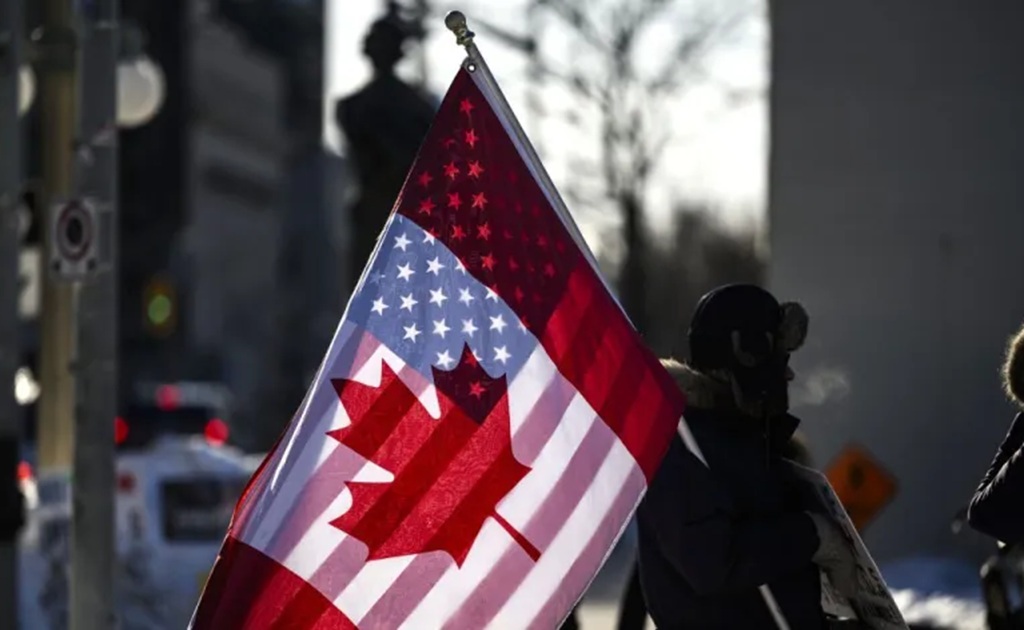News
President Trump Pauses Tariffs on Canada and Mexico

President Donald Trump agreed to a 30-day pause in tariff threats against Mexico and Canada on Monday, as America’s two largest trading partners took steps to address his concerns about border security and drug trafficking.
The pauses provide a respite after a tumultuous few days that saw North America on the verge of a trade war that threatened to crush economic growth, cause prices to skyrocket, and end two of the United States’ most important partnerships.
“I am very pleased with this initial outcome, and the Tariffs announced on Saturday will be paused for a 30 day period to see whether or not a final Economic deal with Canada can be structured,” Trump wrote on Twitter. “FAIRNESS FOR ALL!”
Canadian Prime Minister Justin Trudeau announced Monday afternoon on X that the pause would take place “while we work together,” stating that his government would appoint a fentanyl czar, designate Mexican cartels as terrorist groups, and establish a “Canada-U.S. Joint Strike Force to combat organized crime, fentanyl, and money laundering.”
Trump Tariffs Paused
The pause comes after a similar move with Mexico, which allowed for a period of negotiations on drug smuggling and illegal immigration. The 10% tariff that Trump ordered on China will still go into effect on Tuesday, though Trump intends to meet with President Xi Jinping in the coming days.
While the trade war that investors, businesses, and political leaders feared appears less likely, the drama surrounding Trump’s tariff threats has not ended. Canada and Mexico bought some more time, but Trump can easily renew his tariffs and has already announced taxes on European Union imports.
This leaves the global economy unsure whether a crisis has been avoided or a disaster could still strike in the coming weeks.
On Saturday, Trump directed 25% tariffs on Mexican and Canadian imports, with an additional 10% tariff on Canadian oil, natural gas, and electricity. The US president had repeatedly predicted these moves, but they still surprised many investors, lawmakers, businesses, and consumers.
Multiple analyses by the Tax Foundation, the Tax Policy Center, and the Peterson Institute for International Economics found that tariffs could harm growth, reduce incomes, and raise prices. Despite promises to reduce inflation, Trump insisted on tariffs as necessary tools to persuade other countries to end illegal immigration, prevent fentanyl smuggling, and treat the United States with respect.
Trump and Mexican President Claudia Sheinbaum announced a month-long pause in increased tariffs against each other following what Trump described on social media as a “very friendly conversation. ” Trump said he looked forward to future talks.
“I look forward to participating in those negotiations, with President Sheinbaum, as we attempt to achieve a ‘deal’ between our two Countries,” the president wrote on his official Twitter account.
Strengthening the border
Trump stated that Secretary of State Marco Rubio, Treasury Secretary Scott Bessent, Secretary of Commerce nominee Howard Lutnick, and Mexican high-level representatives would lead the talks. Sheinbaum stated that she was strengthening the border with 10,000 members of her country’s National Guard and that the United States government would commit “to work to stop the trafficking of high-powered weapons into Mexico.”
In 2019, when Mexico avoided Trump’s tariffs, the government announced that it would send 15,000 soldiers to its northern border. However, for much of Monday, the outlook for Canada was bleak, with only an agreement coming together.
A senior Canadian official stated that Canada was not as confident in its ability to avoid the looming tariffs as Mexico. That’s because Canada believes the Trump administration has shifted its requests to Canada more than it did to Mexico. The official spoke on the condition of anonymity because they were not authorized to speak publicly.
When asked Monday afternoon what Canada could offer in tariff talks, Trump told reporters in the Oval Office, “I don’t know.” He considered making Canada the 51st state part of an ongoing rivalry despite decades of friendship with Canada spanning World War II to the response to the 9/11 terrorist attacks.
“If we can’t make a deal with China, then the tariffs will be very, very substantial,” the US president said.
White House press secretary Karoline Leavitt told reporters that Trump would speak with Chinese President Xi Jinping in the coming days and that the White House would provide an update on the conversation.
Related News:
Trudeau Accused of Using Trump Tariffs for Political Gain